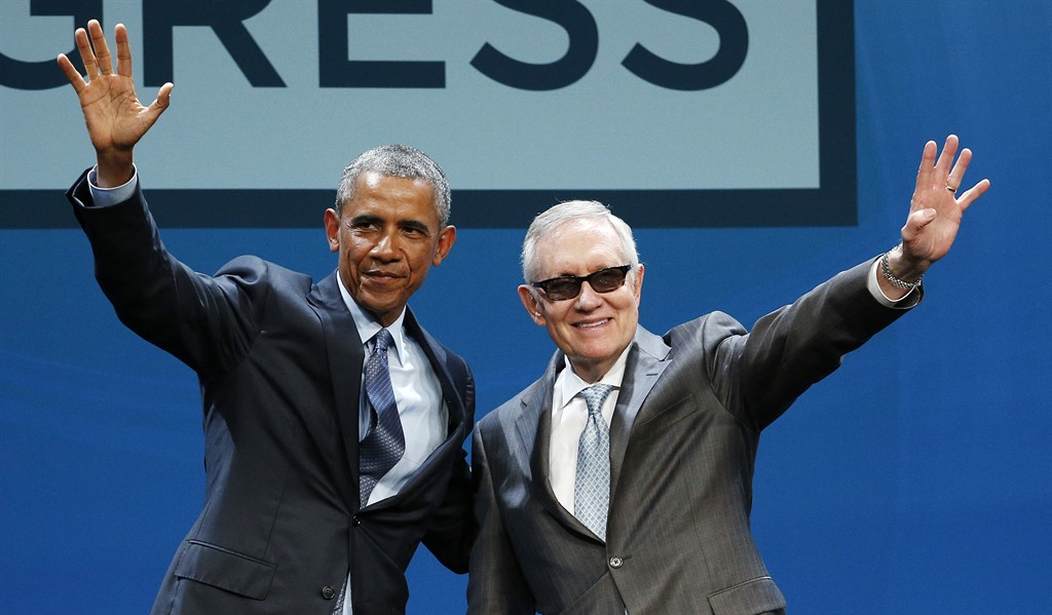Today, the United States Senate commences its formal consideration of President Obama's unpopular, concession-laden nuclear deal with Iran's anti-American regime. The agreement leaves intact and bestows international legitimacy upon the country's rogue nuclear program, furnishes the regime's terrorism-fomenting leaders with tens of billions in sanctions relief, and
Advertisement
McConnell promised that because the Iran deal is such a significant foreign policy issue, he is going to hold the debate in kind of an unusual way. He's asked every senator to be at his or her desk during the entire debate, and every senator will get an opportunity to speak. Now, this is actually really rare. Usually when senators are speaking on the floor, they're talking just to C-SPAN cameras and the chamber's almost completely empty.
All 54 Senate Republicans oppose Obama's 'executive agreement,' with four Democrats joining the opposition: Sen. Chuck Schumer of New York, Sen. Joe Manchin of West Virginia, Sen. Bob Menendez of New Jersey, and Sen. Ben Cardin of Maryland. The latter two are the current and previous ranking Democrats on the Senate Foreign Relations Committee. Fifty-eight percent of Senators will vote to disapprove of the deal, which more or less reflects public opinion on the question. But will there be a vote? At the White House's urging, Democratic Leader Harry Reid is planning to mount a filibuster that would prevent the Senate from voting up-or-down on this matter of sweeping geopolitical consequence. Forty-one Senate Democrats have publicly confirmed their support for the agreement, though several have also expressed reservations and acknowledged serious misgivings. Will every last one of these Democrats go along with Reid's
Recommended
Advertisement
It's not clear if those 41 Democrats will stick together on a filibuster of the disapproval legislation later this week. And Republicans in both chambers are discussing the possibility of voting on Friday, Sept. 11, to put maximum political pressure on Democrats, according to senior GOP sources...Reid has been trying to set up a voting agreement with Senate Majority Leader Mitch McConnell (R-Ky.) to hold a final vote on the disapproval resolution with a 60 vote threshold for approval, hoping to avoid a filibuster vote that Republicans are already portraying as obstructionist. Some Democrats are also wary of the optics of using arcane Senate procedure to reject the disapproval resolution, with Sen. Joe Manchin (D-W.Va.) announcing his opposition to the accord after souring on the possibility he'd be asked to filibuster a resolution of disapproval. Asked on Tuesday morning how he would vote on a filibuster attempt, Sen. Mark Warner (D-Va.), a deal supporter, said he will "wait and see" to hear what the full caucus says during their first post-recess meeting on Wednesday. But regardless of how Democrats get their votes in line, McConnell is unlikely to play ball with Reid's offer.
Advertisement
As well he shouldn't. Reid's "offer" is absurd. Obama has already flipped the political calculus on its head via the power play decision to not submit the deal as a treaty, which would have required the support of two-thirds of the Senate. Reid's supposed compromise would allow his minority caucus to vote down a disapproval resolution without resorting to a controversial filibuster. If Senate Democrats are intent on carrying Obama's water that they're willing to deny their own institution a vote on a important international agreement (designed to bind future Congresses and presidents, by the way), they should be forced to carry out their cynical machinations in the most painful and public way possible. Not only would these Senators be backing Obama's reckless giveaway to the mullahs -- some while publicly portraying themselves and deeply conflicted on the question -- they'd also be actively preventing Congress from even voting on it, for entirely political reasons. This course of action is politically risky. In May, fully 98 Senators voted for a bill that insisted Congress have a significant role in reviewing and weighing the Iran deal, over Obama's initial objections. Will 41 of these members now turn around and hypocritically impede a vote? The American people have been quite clear on this point: A Pew survey from early 2015 showed that
Advertisement

Hell of a sales pitch, champ. Parting question: Is the Obama administration even in compliance with the Corker/Cardin Iran review bill the president signed into law? Strong evidence suggests not.
Advertisement

























Join the conversation as a VIP Member